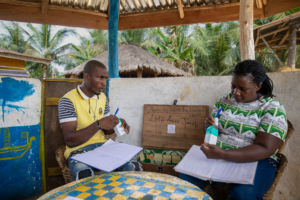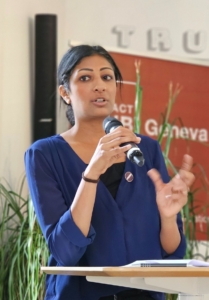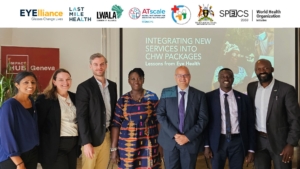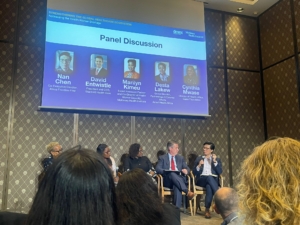“Ultimately, we are going to lean on community health workers more than ever in this moment. So the big question is: are we ready to support them?” – Mallika Raghavan, Deputy Chief Program Officer, Last Mile Health at World Health Assembly 78
World Health Assembly 78 came at a tumultuous time for the community health field. Amidst global aid cuts, those closest to the challenge—people living in rural and remote communities across Africa—are most at risk.
As Deputy Chief Program Officer Mallika Raghavan said, in times of crisis we turn towards those we trust. For millions of people across Africa, that is a local community health worker—and to meet this moment, they need us to step up. As Mallika said at a Devex session on the health workforce, “Are we ready to support them? Do we have the tools, systems, the enabling policies? Will we continue to pay them on time? Will we continue to ensure they have the requisite training? Will they be supervised?”
Across resolutions, side events, and bilateral meetings at the World Health Assembly, community health workers were on the agenda, as was the need for sustained investment in their life-saving work.
Community health workers continue to be a “no regrets investment” and are essential to high-performing health systems
We were honored to join the Community Health Impact Coalition’s energizing side event, where Mallika reminded us that “in crisis and calm, professional community health workers are always a no-regrets investment.”
One of the highlights of the event was a conversation between Dr. Sania Nishtar, CEO of Gavi, and Millicent Miruka, a community health worker from Kenya who is supported by Lwala Community Alliance. “I genuinely believe that if community health workers were further strengthened, all of our public health ambitions would be better served,” Dr. Nishtar said.
As the Honorable Minister of Health from Burkina Faso shared, institutionalization of professional community health workers within a single government term is possible with political leadership. And even amid global aid cuts, momentum is growing for countries to do the same.
Mallika closed the event with a call to action:
- If you’re a policymaker, adopt proCHW national policy and make it your legacy project.
- If you’re a funder, invest in proCHWs and make them a requirement for funding.
- And if you’re a proCHW or allied organization, join the movement.
Momentum is growing towards the High Level Meeting on Non-Communicable Diseases (NCDs) in September—and community health workers must be part of the political declaration
Mallika joined a dynamic side event hosted by EYElliance on integrating eye health into community health worker programs, alongside leaders from Côte d’Ivoire’s Ministry of Health, Uganda’s Ministry of Health, World Health Organization, ATscale, the Global Partnership for Assistive Technology, and Lwala Community Alliance.
Mallika shared takeaways from our work in partnership with the Federal Ministry of Health Ethiopia to roll out the country’s first-ever NCD training for community health workers, which includes eye health. The success of a recent pilot to equip community health workers to screen for presbyopia and distribute reading glasses underscored the power of integrating NCD care into the existing program. After the pilot, community members began recognizing community health workers not just as maternal and child health providers, but as comprehensive healthcare providers who could address a wider range of health needs—critical for an aging population.
As we look towards September’s High-Level Meeting on NCDs and Mental Health, we call on leaders to invest in professional community health workers to deliver integrated health services. We join the NCD Alliance in calling for the explicit inclusion of community health workers as an essential cadre of the health workforce that requires greater investment to meet the growing burden of disease across the world, and in Africa in particular.
Amidst global aid cuts, community health workers deserve trust-based funding

Community health worker Amos Jacob meets with his supervisor, Theresa Mah, in Rivercess County, Liberia.
Per an Africa Frontline First analysis, up to 50% of community health worker programs in Africa are at risk due to the termination of USAID.
As leaders from Last Mile Health, Community Health Impact Coalition, Skoll Foundation, Rippleworks, and Unlock Aid argue in a new Stanford Social Innovation Review article, COVID-19 was our rehearsal for this moment. During the pandemic, philanthropy moved fast. It was bold, trusting, and responsive, mobilizing resources quickly when the need was undeniable. Today’s foreign aid crisis demands the same urgency and courage to ensure essential health services continue in the short term, and we continue to build long-term momentum.
The authors said, “In a crisis, risk is inevitable. The only question is who bears it. Waiting to see how the political winds blow doesn’t mitigate danger—it shifts it. Away from portfolios and toward patients.”
All of this comes back to supporting community health workers as professionals, which is the most effective way to expand access to care for patients. As Africa Frontline First Co-Executive Director Nan Chen said at a McKinsey Health Institute and Devex side event, “At the end of a training, does a community health worker want a hat or a t-shirt? No, they want a career. Training is one piece of the puzzle, but we also need better policy and financing in place to make sure these health workers have dignified jobs to provide care.”







